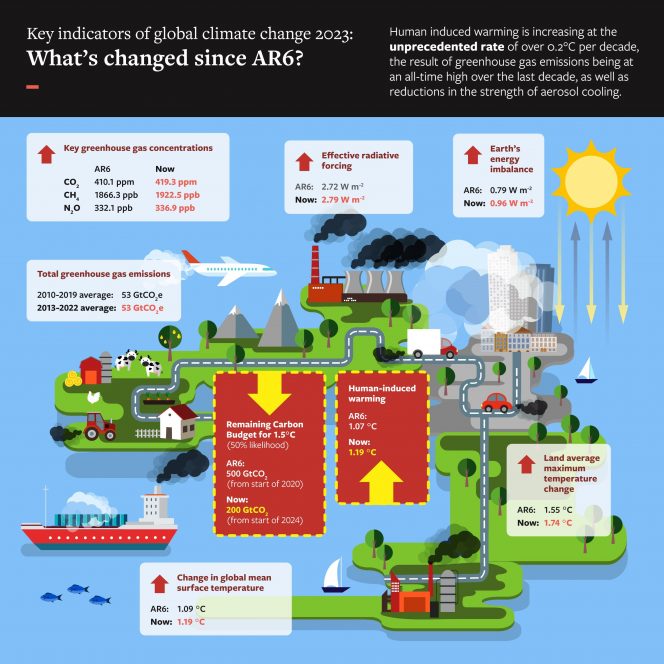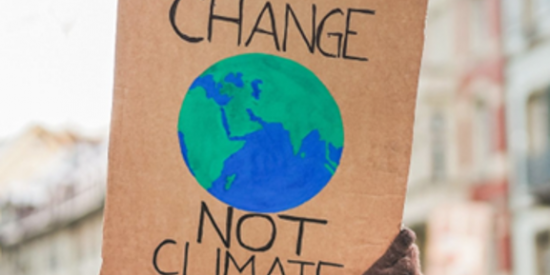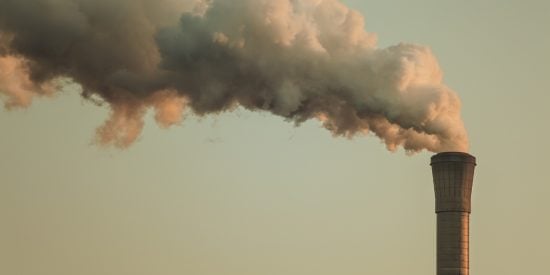
Global warming caused by humans is advancing at 0.26 degrees Celsius per decade, the highest rate since records began, according to new research by over 50 leading international scientists, including Prof Peter Thorne of the ICARUS Climate Research Centre.
The second annual Indicators of Global Climate Change report reveals that human-induced warming has risen to 1.19 degrees Celsius over the past decade (2014-2023) – an increase from the 1.14 degrees Celsius seen in 2013-2022, as set out in last year’s report.
Looking at 2023 in isolation, warming caused by human activity reached 1.3 degrees Celsius. This is lower than the total amount of warming experienced in 2023 (1.43 degrees Celsius). This indicates that natural climate variability, in particular El Niño, also played a role in 2023’s record temperatures.

“The lights on the dashboard are flashing an urgent red and we absolutely need to start paying attention and taking sustained, meaningful and consequential climate actions as governments, communities and individuals. Otherwise things will get much worse very, very quickly.”
The analysis also shows that the remaining carbon budget - how much carbon dioxide can be emitted before committing us to 1.5 degrees Celsius of global warming - is only around 200 gigatonnes (billion tonnes), around four years' worth of current emissions.
In 2020, the Intergovernmental Panel on Climate Change (IPCC) calculated the remaining carbon budget for 1.5 degrees Celsius was in the 300 to 900 gigatonnes of carbon dioxide range, with a central estimate of 500. Since then, CO2 emissions and global warming have continued. At the start of 2024, the remaining carbon budget for 1.5 degrees Celsius now stands at 100 to 450 gigatonnes, with a central estimate of 200.
The Indicators of Global Climate Change Project is being coordinated by Professor Piers Forster, Director of the Priestley Centre for Climate Futures at the University of Leeds. He said: “Our analysis shows that the level of global warming caused by human action has continued to increase over the past year, even though climate action has slowed the rise in greenhouse gas emissions. Global temperatures are still heading in the wrong direction and faster than ever before.
“Our analysis is designed to track the long-term trends caused by human activities. Observed temperatures are a product of this long term trend modulated by shorter-term natural variations. Last year, when observed temperature records were broken, these natural factors were temporarily adding around 10% to the long-term warming.”
The warning comes as climate experts meet in Bonn to prepare the ground for the COP29 climate conference which takes place in November in Baku, Azerbaijan.
The authoritative source of scientific information on the state of the climate is the UN’s Intergovernmental Panel on Climate Change (IPCC) but its next major assessment will not happen until around 2027, this creates an “information gap”, particularly when climate indicators are changing rapidly.
The new report, which is published by more than 50 scientists in the journal Earth System Science Data, is accompanied by an open data, open science platform – the Climate Change Tracker’s Indicators of Global Climate Change dashboard which provides easy access to updated information on the key climate indicators.
Professor Forster added: “Fossil fuel emissions are around 70% of all GHG emissions and clearly the main driver of climate change, but other sources of pollution from cement production, farming and deforestation and cuts to the level of sulphur emissions are also contributing to warming.
“Rapidly reducing emissions of greenhouse gases towards net zero will limit the level of global warming we ultimately experience. At the same time, we need to build more resilient societies. The devastation wrought by wildfires, drought, flooding and heat waves the world saw in 2023 must not become the new normal.”
It is hoped that the report will play a strong role in informing new Nationally Determined Contributions, the improved climate plans that every country in the world has promised to put forward to the United Nations Framework Convention on Climate Change (UNFCCC) by 2025 to cut emissions and adapt to climate impacts.










